The Big Read: After more than 500 days, home remains a bridge too far for Malaysians stuck in Singapore
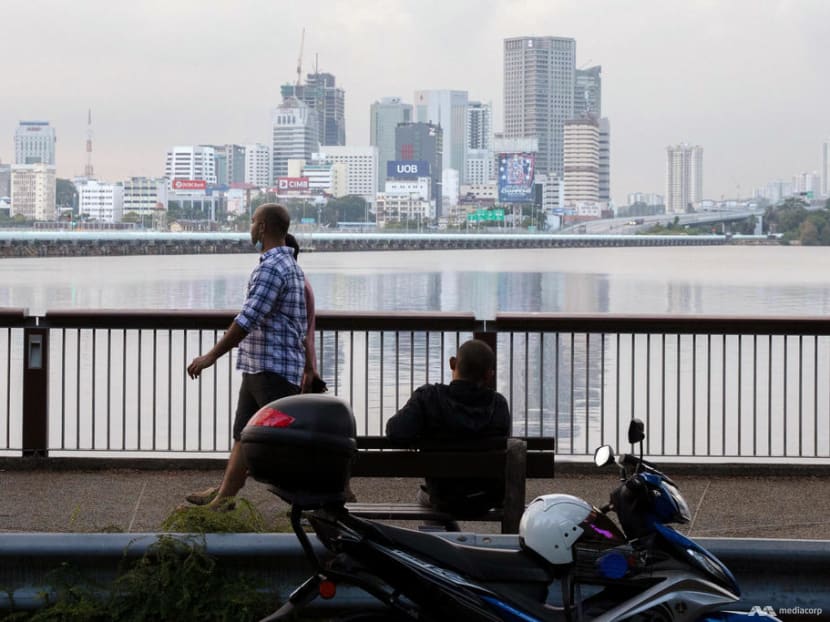
For many Malaysians working in Singapore, what they initially thought would be a temporary disruption has turned into an indefinite stay in the Republic, as the COVID-19 virus refuses to go away, forcing both the Singapore and Malaysian governments to continue restricting travel across the Causeway until today. (Photo: Ili Nadhirah Mansor)
- Many Malaysian workers who commute to Singapore daily for work have been stranded in Singapore since March last year
- Border restrictions, quarantine requirements have made it difficult for them to go back home to their families
- Meanwhile, they have to grapple with additional living expenses at an exchange rate that is over three times higher
- Some Singaporeans living in Malaysia are in a similar predicament
- Many are hoping that the situation will improve next month when border restrictions are expected to ease, yet they are wary of getting hopes up too high
SINGAPORE: The last time Mr Lim Kok Leong was able to embrace his then five-year-old daughter was on Mar 17 last year, more than 500 days ago.
“It’s been really tough ... my little princess. At this age, they grow up very fast. And I’ve been able to see that from the chubby and bubbly type, she’s growing skinnier and taller day by day … But I’m missing out on all of that,” said the 43-year-old Malaysian, who became a Singapore permanent resident about a decade ago.
For more than half of his life, since 1999, Mr Lim had been making the daily commute across the Causeway from his house in Johor Baru to Singapore, where he currently works as a biomedical engineer.
But the COVID-19 pandemic which began raging early last year threw his daily routine, and his life, into disarray.
Mr Lim has been counting the days: As of Saturday (Aug 7), a total of 508 days have passed since he last returned home, causing him “great pain”.
While stuck in Singapore, Mr Lim yearns to be reunited with his wife and young daughter, as well as his ailing parents and parents-in-law.
“Many people don’t think it is a big deal. They compare us with the foreign workers who come to Singapore to work but the difference is that before coming, they are mentally prepared to stay here for a few years.
“But we were unprepared. We had one day to come into Singapore. We were told this would last for two weeks,” Mr Lim said, referring to the Malaysian’s government sudden announcement to impose the first nationwide lockdown last year.
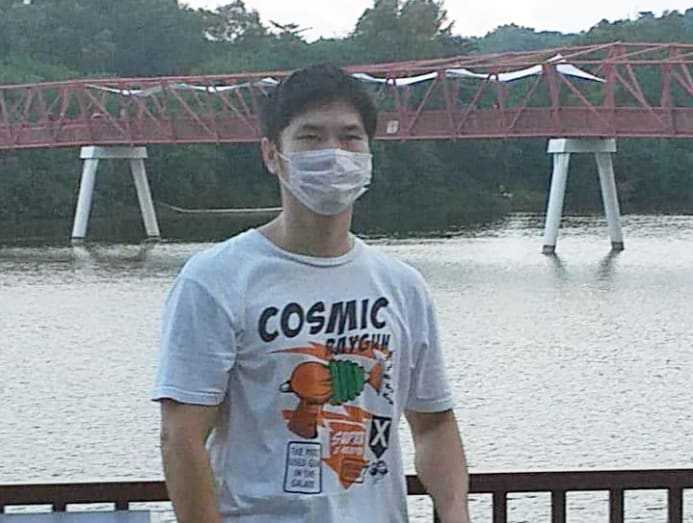
On Mar 16 last year, amid a worrying spike in COVID-19 cases, Malaysian Prime Minister Muhyiddin Yassin announced that a “movement control order (MCO)” would be implemented from Mar 18 to Mar 31 last year. The MCO meant that all businesses, except for outlets like supermarkets and convenience stores, had to close, along with houses of worship, schools and universities. There was also a ban on mass gatherings.
All Malaysians were barred from travelling abroad, and foreign tourists and visitors were not allowed to enter the country. This meant that Malaysian workers in Singapore had just one day to make arrangements for what they thought would be a two-week stay here.
The sudden turn of events saw droves of Malaysian working here rushing to enter Singapore on Mar 17 last year, via the Johor-Singapore Causeway. They braved long queues and traffic jams as they tried to make their way into Singapore before the lockdown took effect at midnight.
“On that fateful night on Mar 17, everybody was just rushing in. There were a lot of things that we thought that we could just hold off for two weeks, then we can go back again and we can just move on with life,” said Mr Lim.
Unfortunately, what many had thought would be a temporary disruption has turned into an indefinite stay in the city, as the coronavirus refuses to go away, forcing both the Singapore and Malaysian governments to continue restricting travel across the Causeway until today.
What was meant to be a temporary relocation for a couple of weeks turned to months, and then to over a year and counting.
The Causeway — once one of the world’s busiest land border crossings, where more than 300,000 Malaysians used to cross it daily pre-pandemic — is now lifeless, empty of traffic.
Like Mr Lim, fellow Malaysian Muhammad Fariezatul Firdaus Ahmed has also not returned home since Mar 17 last year.
As the youngest son who is unmarried, his family members rely on the 30-year-old for financial support. His mother left her job to look after his father who has a stroke and he has a sister who is disabled.
Mr Fariezatul, a cleaner who has been working in Singapore since 2016, also continues to pay rent monthly for his unoccupied home in Johor Baru, which he used to return to every night.
“I can’t think about going home because I have a lot of financial commitments back home.
“I need to stay here and work but maybe if the cost of returning home for a short holiday is not such a burden, I would consider it,” he said.
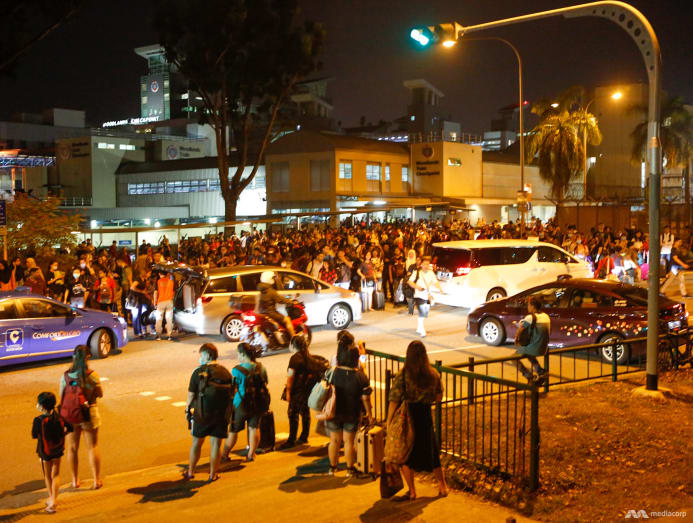
OBSTACLES IN THEIR WAY
While the authorities in both countries have introduced a few special schemes to allow some form of travel, many Malaysian workers in Singapore have not been able to take advantage of them due to the sharp rise in COVID-19 cases every now and then, as well as the costs involved.
For example, the Periodic Commuting Arrangement (PCA) is a travel lane agreed between the two governments which supports companies in Singapore and Malaysia by facilitating the movement of workers, according to Singapore's Immigration and Checkpoints Authority’s (ICA) SafeTravel website.
Companies which need to bring their employees into Malaysia or Singapore can sponsor an application. Such applications could be made from Aug 10 last year.
Under the PCA, approved travellers or employees are required to remain in their country of employment for at least 90 days before returning to their home country for short-term home leave. Cross-border entry under the PCA is only permitted via land at the Causeway and Second Link.
Under the PCA, Malaysians returning home from Singapore were initially required to serve a seven-day home surveillance order and undergo a COVID-19 test.Those with Johor residential addresses on their identification cards were permitted to self-isolate at home until they received a negative COVID-19 test result.
Mr Muhammad Ridzuan Md Khisban, a 32-year-old cleaner, was able to return home to Johor in February under the PCA scheme. Before that, he had not gone home since Mar 17 last year.
He said that back in February, he was only required to self-isolate at home for four days before he received his negative COVID-19 result.
However, since May 13 this year, Malaysia has imposed a strict 14-day quarantine for those entering from Singapore, after the Malaysian authorities listed the Republic as one of several countries that have reported the spread of coronavirus variants in the community.
The 14-day quarantine must be carried out at a government-approved facility.
For those arriving in Singapore, they are required to take a COVID-19 Polymerase Chain Reaction (PCR) test at the checkpoint. They must then serve a 14-day stay-home notice (SHN) at a dedicated facility.
Apart from the PCA, there is also the Reciprocal Green Lane (RGL) which was allowed for short-term travel of up to 14 days.
The RGL — which has also been suspended since May 13 — applies only to essential business or official travellers, and requires a much stricter, controlled itinerary. For instance, these travellers cannot use public transport except for private-hire cars and taxis, unlike those under the PCA.
For many Malaysians in Singapore, the quarantine and SHN requirements constitute the biggest stumbling block to a family reunion.
“I want to go home, even for just a short while but… We have to pay for the quarantine in Malaysia and then again when we re-enter Singapore. It’s really a burden,” said Mr Fariezatul, who earns up to S$1,500 a month including overtime pay.
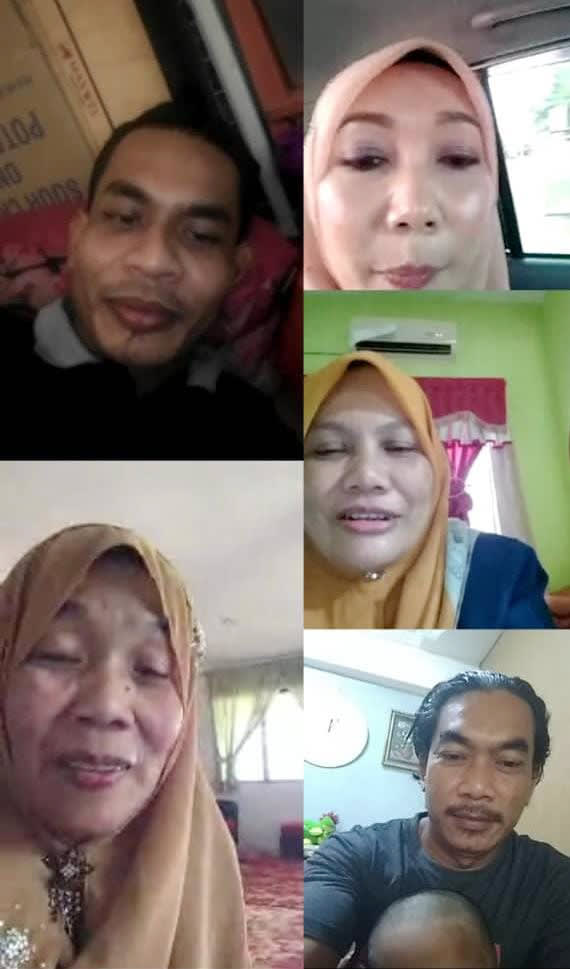
Quarantine charges in Malaysia start at RM150 (S$48) per day, depending on the chosen designated hotel, totalling about at least RM2,100 for the 14-day period.
The cost of staying in a SHN dedicated facility in Singapore for 14-days is S$2,000 for a single adult for accommodation and food, according to ICA’s SafeTravel website.
Mr Fariezatul, like many Malaysians working here, has already had to grapple with additional living expenses at an exchange rate that is over three times higher, due to his prolonged stay in Singapore.
He is paying S$200 a month in rent for a room in a Housing and Development Board (HDB) flat which he shares with another worker. His company helps him by paying the other half of his rent which totals to S$400.
“I have no choice but to stay here because if I go back, there are no jobs in Malaysia right now,” he said.
“I make just enough to support my family and sustain my life here … I can’t really think about spending so much money just to go home.”
Related:
In recent weeks, there have been calls from Malaysians working in Singapore for the Malaysian government to remove quarantine requirements for those who are fully vaccinated.
An online petition asking for such a waiver had garnered 17,500 signatures as at 5pm on Thursday.
Johor Chief Minister Hasni Mohammad, in a tweet accompanying a repost of a news article on the issue, also said on Aug 2: “Fully vaccinated Malaysians returning from Singapore should complete their 14 days quarantine at home.”
Two other state leaders — Johor health and environment committee chairman R Vidyananthan and Johor investment, cooperatives, entrepreneurship development and human resources committee chairman Mohd Izhar Ahmad — had previously made similar calls.
Last month, Mr Muhyiddin said his government was considering removing the requirement for fully vaccinated travellers arriving in Malaysia to be quarantined at designated facilities. But no decision has been announced yet.
Mr Ridzuan, the cleaner, was lucky to have his employer, Sembcorp, bear the cost of his 14-day SHN when he returned to Singapore in March after his trip home.
“They said they will pay for our first SHN. Second time onwards, we have to bear the cost ourselves, but I’m grateful,” said Mr Ridzuan.
Mr Ridzuan, who got engaged in December 2019, returned home in February this year to get married so that his wife would be able to care for his aged parents and 10-year-old son from his previous marriage while he is working in Singapore.
Like Mr Fariezatul, Mr Ridzuan said leaving his job here to return to Malaysia is not an option.
“I was without a job in Malaysia for six months before I started working in Singapore. All I can do is be mindful of how I spend my money here and try to care for my family from afar,” said Mr Ridzuan.
He takes home a basic monthly salary of S$1,300, and earns up to S$2,400 including overtime pay. Of this, he forks out S$490 a month for rental.
He said he has started to save up, just in case, to pay for the quarantine costs as he plans to return home for Hari Raya Aidilfitri around May next year.
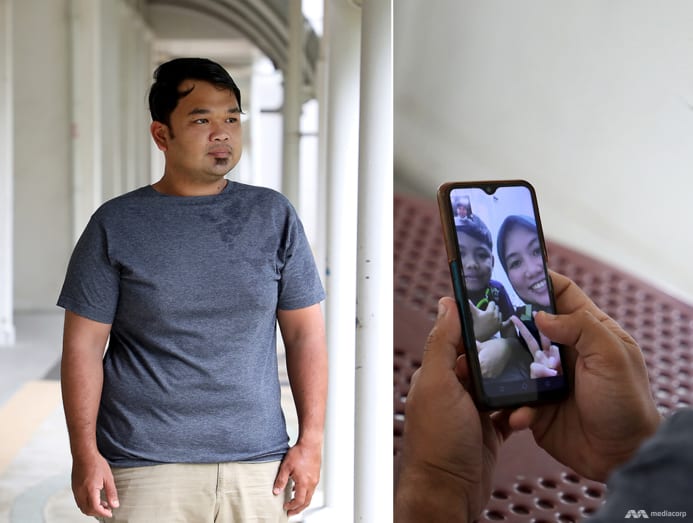
For Mr Lim, the biomedical engineer, the issue is not so much about the quarantine costs that he has to bear. His job requires him to work onsite and his annual leave will not be able to cover his trip home.
“If I go back, I would want to spend at least one or two months (in Johor), then it will be worth it. But at most, I will maybe get two weeks’ off and two weeks is not even able to cover one quarantine period so it’s not possible,” he said.
NO LAST GOODBYES FOR SOME
While being separated for months from their loved ones has caused much anguish for many Malaysians working here, there are those who have to bear the pain of not being able to pay their last respects to family members who have died.
Ms Siti Nur Rahimah Hamdan, who has been working in the hygiene services industry in Singapore for over three years, had planned to return to her home in Ipoh, Perak, on Jun 1 via the PCA scheme as her father had been suffering from complications with his kidneys and diabetes.
However, he died on May 7. When Ms Siti informed her employer, they asked if she wanted to return to Malaysia via the Death and Critically Ill Emergency Visits scheme, where one is allowed to attend a funeral or see a critically ill family member for about three hours before returning to Singapore.
Upon returning to Singapore, she would have to serve a 14-day quarantine.
Since she would have already missed his funeral, Ms Siti decided to stick to her plan of returning to Ipoh on June 1. But when she learnt that from May 13, the 14-day quarantine would be implemented, she quickly informed her employer that she would like to return before then.
After reaching Johor Baru on May 12, Ms Siti said that she only self-isolated for two days before receiving her negative result and was allowed to go home to Ipoh.“It’s so hard. So many others have been in this same situation or even worse. At least I could see his (father’s) grave eventually,” she said.
Mr Arafat Mahyiddin, 38, has also been unable to say his final goodbyes to two family members who died in Malaysia in the past year due to fears that he might not be allowed back into Singapore causing him to lose his job, and also because of the high cost of quarantine.
His brother-in-law died earlier this week after contracting COVID-19, while his father died in August last year.
Apart from being financially responsible for his family and his wife’s grandmother, he will now have to help his widowed sister.
“My children, aged 12 and 1, are still small… If we work in Malaysia, we are able to be with our families every day but we face the risk of uncertain employment and the risk of working outside. The current high number of COVID-19 cases also puts the family at risk.
“Even if we have to be apart, with the salary I receive (working in Singapore), at least food and a roof over my family’s head can still be guaranteed,” said Mr Arafat, who works in logistics.
Mr Arafat also hoped that the Malaysian government could find some ways to help Malaysians working in Singapore.
“If every month we are allowed to return to Malaysia for three days without the need for quarantine, it is already sufficient for us,” he said.
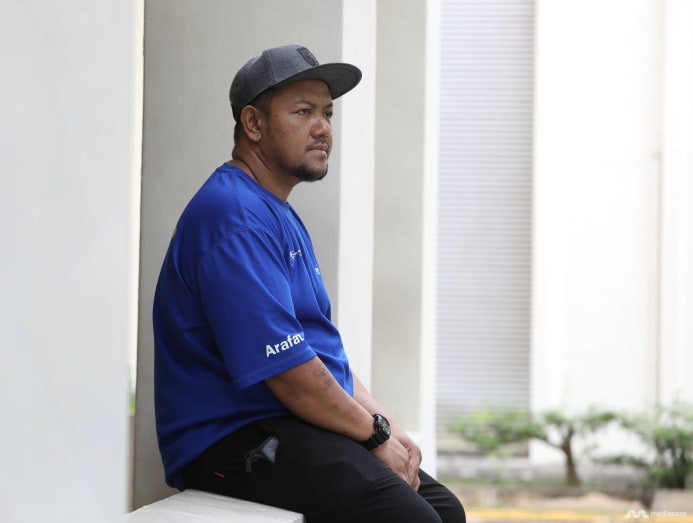
THE SITUATION ON THE OTHER SIDE
For some Singaporeans living in Malaysia, they are in a similar predicament.
Business owner Rizal Mohamad, who has been living in Malaysia since 2014, said the hardest part about being away from his family is missing special moments with loved ones.
“The last time I saw my niece she was only around eight months old, still not able to walk yet and now she is already running,” said Mr Rizal, who married a Malaysian wife and settled down across the Causeway.
He was last in Singapore in November 2019 and used to visit his extended family here every two to three months.
“Of course I wish to go back. I have not met my parents, grandfather and siblings for almost 18 months now … Thankfully for technology we can video call, but nothing beats meeting them in person,” he said.
Mr Rizal’s main concern, however, is that given “how fast things change”, he may not be able to go back to his wife in Malaysia if he chooses to return to Singapore, should there be any new restrictions implemented due to the COVID-19 situation.
The cost of quarantine on both sides is also an issue, “especially with the economy being so bad now in Malaysia”, he said.
“Business owners are the worst hit now. Initially I used to run a travel agency, but had to pivot the business in order to sustain ourselves,” said Mr Rizal, who now runs Snack Town, an e-commerce platform selling snacks.
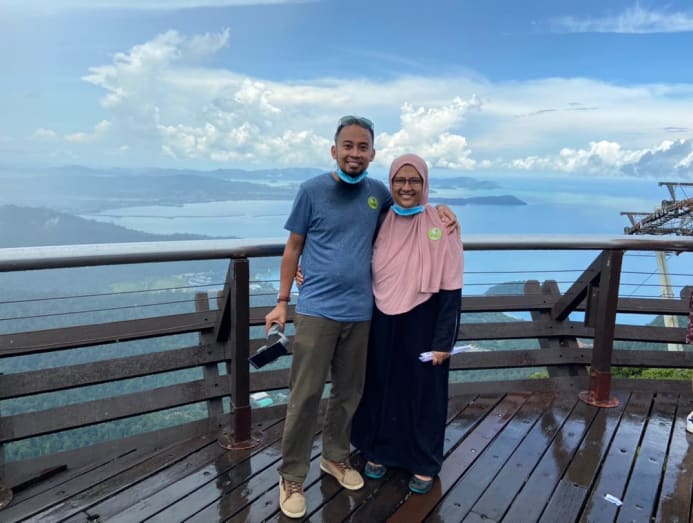
Retiree Jamaludin Abd Ghani, 58, who moved to Kuala Lumpur in 2018 after getting married to a Malaysian has not been able to return to Singapore to visit his four children and grandchildren, two of whom he has not even met.
“The main reason I haven’t been able to go back to Singapore is because of the cost of quarantine and return back to Malaysia,” he said.
Foreign nationals, including Singaporeans, will need to pay an additional RM2,600 for “operational costs”, on top of the RM2,100 subsidised fee which Malaysians pay for the accommodation and food during quarantine.
For Singaporeans in Malaysia seeking to return home, the Singapore authorities are open to helping them if necessary.
Mr Sharael Taha, who is a Member of Parliament (MP) for Pasir Ris-Punggol Group Representation Constituency (GRC), said that he has received a range of requests from Malaysians and Singaporeans who wish to travel across the border for a variety of reasons.
“I had one case in May where a Singaporean working in warehousing in Malaysia wanted to come home for some time to visit his family here but as his income was badly affected due to the pandemic, the cost was just too much to bear. We made an appeal for his stay-home notice to be waived or partially waived and he was able to come home,” he said.
“When it comes to reuniting families or when they need to come in or go back for emergency reasons, the appeal process is quite smooth,” he said.
Sembawang GRC MP Poh Li San said that she has received similar requests from Singaporeans and permanent residents who have families in Malaysia. To date, she has helped “at least a dozen” to appeal through ICA and the Ministry of Foreign Affairs.
“The authorities have been very helpful, we have a few success cases. There is a working system in place and it’s a risk-based approach,” she said.
PLEAS FOR HELP
Malaysians in Singapore are also turning to their government to address their situation, though they have not had much luck so far.
On Wednesday, a group of seven Malaysians here went to the High Commission of Malaysia to submit a letter asking for the removal of the 14-day quarantine for those who are fully vaccinated.
However, they were prohibited from entering the premises as they did not have a prior appointment. A security guard later told the group that their letter would be passed to the relevant members in the High Commission instead.
Queries have been sent to the High Commission.
Ms Shama Veswanathan, 42, was among the group of Malaysians who turned up at the High Commission. She has been working in the security industry here since 2013.
“To us, Singapore is a low-risk country ... So why do we need to quarantine for 14 days in a hotel when we enter Malaysia? RM2,100 is not a small amount of money,” she said.
“In Malaysia, there are a lot of political matters at the moment. They’re more concerned about that… And for us in Singapore, it feels like they have forgotten us.”
Political tensions have been rising in Malaysia, with Prime Minister Muhyiddin under pressure after key allies withdrew support for his government.
Ms Shama said allowing for home quarantine or reducing the number of days in a facility will not only lower costs but also allow them to spend more time with their families. “Most workers have only 14 to 21 days annual leave so we don’t need to take unpaid leave when we go back. We really hope that they will see our letter and they will do something about it,” she said.
Malaysia-Singapore Workers Task Force president Dayalan Sreebalan, who guided the group in submitting the letter, said he has received many pleas for help from Malaysians working here, including those seeking legal aid because their spouses are having affairs.
He said that many have also reached out due to financial problems and the need to return home due to family emergencies, such as death in the family. He comes across five to 10 death cases daily.
As such, more needs to be done for these families who are being kept apart, Mr Dayalan said.
“They are coming from a very safe country (Singapore), they have all the vaccines, they are willing to do all the tests that you need and if it’s negative, what is the point in keeping them in a hotel?”
Akmal Nasrullah Mohd Nasir, the MP for Johor Baru, said that he raised the issue in Malaysia’s Parliament last week but has not received a response from officials if anything will be done.
“In our country, the Prime Minister has been promising since last week that they will relax some restrictions at least within the country and for interstate travel,” he said. “I raised the point so that the Malaysian government will similarly relax restrictions for those Malaysians in Singapore who are fully vaccinated.”
Mr Salahuddin Ayub, the MP for Pulai, which is in Johor, said that many of his constituents who used to work in Singapore had since returned to Malaysia or made the decision to leave their jobs before the lockdown was imposed last year.
Calling on policymakers on both sides of the Causeway to look into the situation, he added: “Malaysians need to work, they need Singapore for work. But at the same time, those in Singapore need their families.”
GOOD SAMARITANS STEP FORWARD
While they are hoping for the authorities to improve their plight, several Malaysians here said they are appreciative of what some individuals and firms in Singapore have been doing for them.
Mr Fariezatul, for example, said that many Singaporeans have rallied around him, and have become almost like “adoptive parents”.
One of them is retiree Mohd Razib Ibrahim, 56, who has been distributing packets of food to Malayasian workers here since Mar 18. Currently, he works with charity Willing Hearts to provide over 1,100 packets of food to these workers for dinner daily.
“Other than dinner we also provide them with groceries, toiletries and prayer garb, anything that they can use,” said Mr Razib, adding that the items collected are donations from his friends.
He added: “We want to do what we can to help the workers who are here because if they go back, they don't have work, times will be very bad.”
Since March last year, real estate firm Cushman & Wakefield's facilities and engineering arm, C&W Services, has been paying for the accomodation of 150 of its Malaysian workers. It also provides them with a monthly living allowance to help them manage Singapore’s higher cost of living, said C&W Services managing director Natalie Craig.
“A one-time cash payment was also made to them in recognition of their dedication,” she said.
She noted that many of the firm’s Malaysian workers have chosen to remain in Singapore to support its operations, even though they would be separated from their families indefinitely. “We are deeply grateful to them for the sacrifices that they are making, and we feel a strong sense of responsibility to take care of their well-being,” she said.
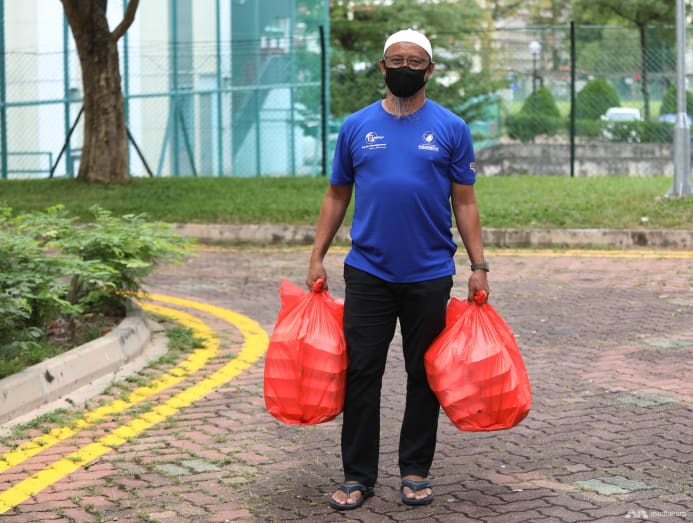
LIGHT AT THE END OF THE TUNNEL SOON?
Mr Lim, the Malaysian biomedical engineer, said that despite having a stable job in Singapore, he is thinking of quitting to return home to his family if the situation doesn’t change by next month.
He noted that many of his compatriots working in Singapore are similarly looking forward to Singapore’s plans to ease border restrictions next month, particularly for vaccinated travellers.
“We don’t know what’s going to happen and this feels like it’s never ending. There has to be a full stop so I will have to make a decision. I’m very, very worried about my financial situation if I go back, but we just have to trust God,” Mr Lim said. “If it doesn’t open up by then (September), then we have a rough idea that it will never open up again forever so I will proceed to resign.”
Still, given how tricky the COVID-19 virus is, many are trying not to get their hopes up too high, in case they get dashed again.
Ms Siti added: “Am I hoping for good news in September? Of course… But at the same time, I don’t want to be too hopeful. Every few months last year, we had hope that things would go back to normal. Now it’s already August 2021.”
For more news like this, visit todayonline.com
BOOKMARK THIS: Our comprehensive coverage of the COVID-19 pandemic and its developments
Download our app or subscribe to our Telegram channel for the latest updates on the coronavirus pandemic: https://cna.asia/telegram













